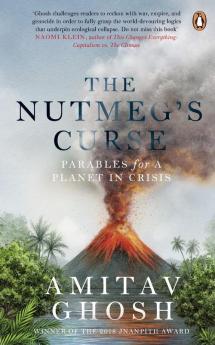English
Hardback
₹516
₹799
35.42% OFF
(All inclusive*)
Delivery Options
Please enter pincode to check delivery time.
*COD & Shipping Charges may apply on certain items.
Review final details at checkout.
Looking to place a bulk order? SUBMIT DETAILS
About The Book
Description
Author
The author of The Great Derangement finds the origins of our climate crisis in Western colonialism’s violent exploitation of human life and the environment.. A powerful work of history essay testimony and polemic Amitav Ghosh’s new book traces our contemporary planetary crisis back to the discovery of the New World and the sea route to the Indian Ocean. The Nutmeg’s Curse argues that the dynamics of climate change today are rooted in a centuries-old geopolitical order constructed by Western colonialism. At the center of Ghosh’s narrative is the now-ubiquitous spice nutmeg. The history of the nutmeg is one of conquest and exploitation—of both human life and the natural environment. In Ghosh’s hands the story of the nutmeg becomes a parable for our environmental crisis revealing the ways human history has always been entangled with earthly materials such as spices tea sugarcane opium and fossil fuels. Our crisis he shows is ultimately the result of a mechanistic view of the earth where nature exists only as a resource for humans to use for our own ends rather than a force of its own full of agency and meaning.. Writing against the backdrop of the global pandemic and the Black Lives Matter protests Ghosh frames these historical stories in a way that connects our shared colonial histories with the deep inequality we see around us today. By interweaving discussions on everything from the global history of the oil trade to the migrant crisis and the animist spirituality of Indigenous communities around the world The Nutmeg’s Curse offers a sharp critique of Western society and speaks to the profoundly remarkable ways in which human history is shaped by non-human forces.
Delivery Options
Please enter pincode to check delivery time.
*COD & Shipping Charges may apply on certain items.
Review final details at checkout.
Details
ISBN 13
9780670095629
Publication Date
-10-10-2021
Pages
-201
Weight
-222 grams
Dimensions
-135x216x22.59 mm








